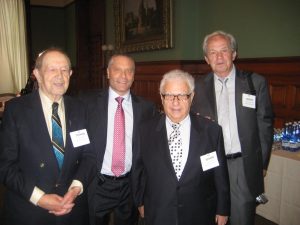A “spellbinding” lecturer who taught many Canadian students taking educational programs in Israel, Prof. Zeev Mankowitz passed away this past February in Jerusalem. His impact on Jewish education and Holocaust remembrance in Canada will continue through his book and articles, as well as through the work and influence of his many students.
A scholar of Holocaust studies, Mankowitz frequently visited Canada and had a lasting effect on the development of Holocaust commemoration and study here. His research explored the post-Shoah experience of she’erit hapletah, the surviving remnant who, despite their many burdens and challenges, made exceptional intellectual, cultural and communal contributions to their respective local communities and the wider Jewish world.
A leader in the Habonim Zionist organization in his native South Africa, Mankowitz made aliyah in 1963. A Hebrew University-educated historian, he became well known to Canadian students for his widely acclaimed, jam-packed courses in Holocaust studies at Hebrew University’s Rothberg International School.
Former students of his recall Mankowitz as a model of respect and dignity, who demonstrated a unique love of learning.
“He was spellbinding,” Leora Stoll, a Toronto business developer and consultant, recalls. “I still remember the exam essay. There are two points of view on the Holocaust – that of the ‘functionalist’ and that of the ‘intentionalist.’ We had to take a side and argue it. If you ask me about any of my other courses from my undergraduate degree, I am not sure I would be able to even remember the course title, let alone the material.”
Mankowitz’s impact on students also stemmed from his behaviour outside the classroom.
Howard Lichtman, president of the Lightning Group in Toronto, recalls his early days as a student in 1973. “Within weeks of landing in Israel, the air raid sirens echoed through the streets. Young and naive, we didn’t know that we should’ve been running to air raid shelters. We thought the sirens were heralding the Yom Kippur prayers. Zeev was more than our director during those times – he was our leader.”
Mankowitz continued to distinguish himself as an extraordinary educator and mentor. Through his work at The Institute for Youth Leaders from Abroad (“Machon”), the Mandel Jerusalem Fellows Program and the Melton Centre for Jewish Education, he helped train generations of senior Jewish education professionals.
Jay Brodbar, national executive director at Mazon Canada, said of Mankowitz that “perhaps the most profound lesson is the one I learned from Zeev: the greatest impact an educator can have is through modelling. I learned more about how people learn by experiencing Zeev’s way of interacting. He approached people in the gentlest way possible with great respect and dignity.”
Mark Smiley, director of education at Associated Hebrew Schools of Toronto, has “vivid memories of [Zeev’s] unique love of learning and being excited by ideas in his own learning and with the education of the next generation of adult educational leaders (both formal and formal). I used his book a month ago in a workshop with Associated Hebrew Schools principals.”
Zeev is survived by his two children Yonit and Noam and by his second wife Bella, who continues her work with children with the most difficult learning challenges in her Jerusalem clinic. His first wife, Gene, the children’s mother, predeceased them.
Allan Reitzes, former president of UJA Federation of Greater Toronto, was a good friend of Zeev Mankowitz.






